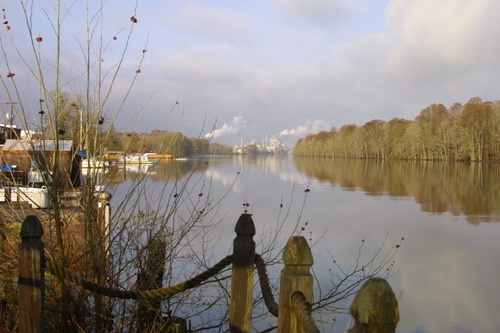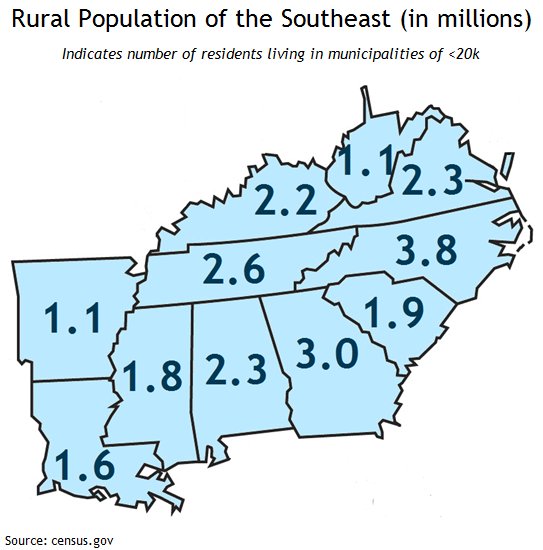Roanoke River, flowing past downtown Plymouth & Domtar Paper Mill
Most people driving through Plymouth, North Carolina on US Hwy 64 on their way back from the Outer Banks wouldn't think twice. They'd pass Pines Elementary, the Golden Skillet, the Super 8, the Bojangles and be on their way. Maybe they'd mention how it's funny that North Carolina has a Plymouth, too. If they had to make a pit stop, they would have already done so up the road in Columbia, a "nice" town - albeit smaller.
They may catch a glimpse of the agricultural research center on the way into town; but they would almost certainly miss the downtown riverfront boardwalk and the historical marker denoting the capture of Plymouth in 1864. And all the while - Plymouth, with its $24,000 median income and near-complete dependency on a paper mill for employment - would continue to slip further and further into an economic abyss.
Much of this behavior can be attributed to how the typical person interprets time (especially on a road trip) - most of us think there's never enough time to do what needs to be done, so who has time to stop and read some marker anyway? Much less spend significant time and money in a place like this.
Another more extreme and less innocuous mindset is manifest when a visitor refers to small towns as "backwaters" whose inhabitants simply aren't smart enough to jump a sinking ship. No matter that they may have a strong personal connection or, conversely, may lack the resources to leave.
This behavior and its many shades speaks to how we perceive value. What would a small town like Plymouth have to offer a visitor anyway? Probably very little, the thinking goes. Pity seems the most logical reaction for those who have to live there.
It makes no sense why we would continue to willfully and carelessly badmouth towns like Plymouth. And I believe we do so at our own risk, as Plymouth is one of hundreds of towns in shockingly similar economic and social circumstances throughout the South.
They may catch a glimpse of the agricultural research center on the way into town; but they would almost certainly miss the downtown riverfront boardwalk and the historical marker denoting the capture of Plymouth in 1864. And all the while - Plymouth, with its $24,000 median income and near-complete dependency on a paper mill for employment - would continue to slip further and further into an economic abyss.
Much of this behavior can be attributed to how the typical person interprets time (especially on a road trip) - most of us think there's never enough time to do what needs to be done, so who has time to stop and read some marker anyway? Much less spend significant time and money in a place like this.
Another more extreme and less innocuous mindset is manifest when a visitor refers to small towns as "backwaters" whose inhabitants simply aren't smart enough to jump a sinking ship. No matter that they may have a strong personal connection or, conversely, may lack the resources to leave.
This behavior and its many shades speaks to how we perceive value. What would a small town like Plymouth have to offer a visitor anyway? Probably very little, the thinking goes. Pity seems the most logical reaction for those who have to live there.
It makes no sense why we would continue to willfully and carelessly badmouth towns like Plymouth. And I believe we do so at our own risk, as Plymouth is one of hundreds of towns in shockingly similar economic and social circumstances throughout the South.
It's reasonable to assume that every community has unique assets and potential to create. Communities are collections of people, anchored around a place or other connective element. So my first assumption flows logically from another - all individuals have unique assets to share and deep potential to create. A community's power, therefore, lies in its ability to generate opportunities as an outgrowth of the connections its residents share. As a country,though, we tend to ignore the potential of towns like Plymouth to generate growth, assuming that growth is somehow impossible anywhere outside of a major city.
For Plymouth - a semi-remote, rural, Southern town in need of a good jolt to stay alive, not to mention thrive - to become this kind of community there must be, above all, wider acknowledgement that its community has its own unique assets and potential to create. Everything else - long-range planning, policy initiatives, small business efforts, and other needed measures - will only reach their greatest potential if they are conducted within that frame. From a state and regional perspective, it will only be when this frame and measures aligned to it become commonplace that towns like Plymouth will begin to show measurable gains towards increased quality of life.
There are nearly 24 million people living in towns smaller than 20,000 in the South. Casually ignoring the potential of those towns, not to mention the growing disparities between urban and rural quality of life, is a perilous habit that we must break.
For Plymouth - a semi-remote, rural, Southern town in need of a good jolt to stay alive, not to mention thrive - to become this kind of community there must be, above all, wider acknowledgement that its community has its own unique assets and potential to create. Everything else - long-range planning, policy initiatives, small business efforts, and other needed measures - will only reach their greatest potential if they are conducted within that frame. From a state and regional perspective, it will only be when this frame and measures aligned to it become commonplace that towns like Plymouth will begin to show measurable gains towards increased quality of life.
There are nearly 24 million people living in towns smaller than 20,000 in the South. Casually ignoring the potential of those towns, not to mention the growing disparities between urban and rural quality of life, is a perilous habit that we must break.



 RSS Feed
RSS Feed
